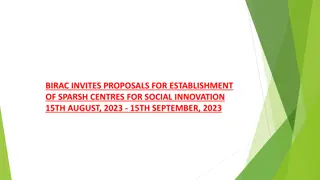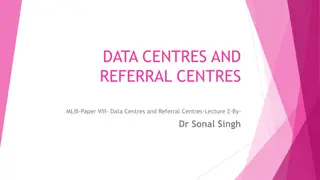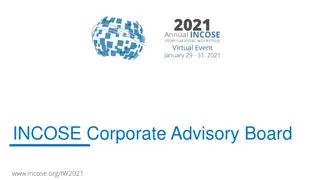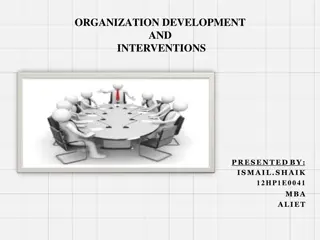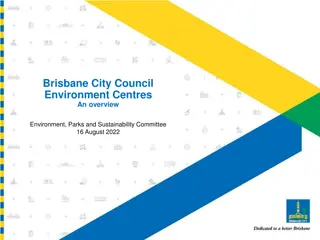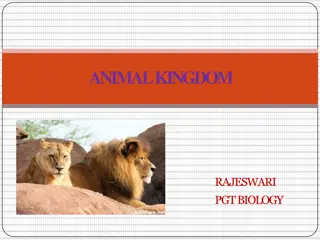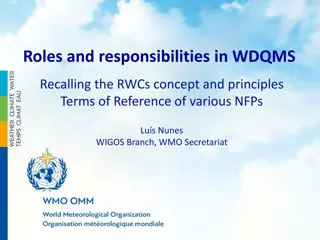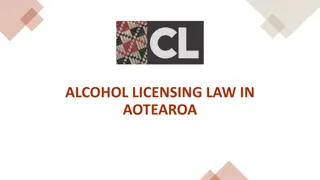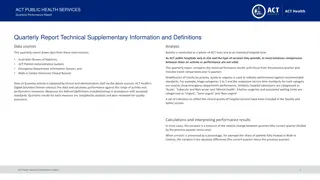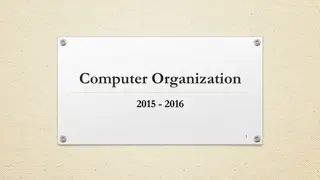Understanding Information Centres: Types and Organization
Modern libraries are evolving into information centres, offering precise information to users. They bridge the gap between user needs and available information. Information centres play a crucial role in providing timely and relevant information, aiding in decision-making and preventing duplication of efforts. They are categorized by specialized interest, ownership, level of service, variety of services, and type of material. Different types include subject-oriented and mission-oriented centres.
Download Presentation

Please find below an Image/Link to download the presentation.
The content on the website is provided AS IS for your information and personal use only. It may not be sold, licensed, or shared on other websites without obtaining consent from the author. Download presentation by click this link. If you encounter any issues during the download, it is possible that the publisher has removed the file from their server.
E N D
Presentation Transcript
INFORMATION CENTRES Types and their Organisation MLIB-Paper VIII-Lecture 1 By Dr Sonal Singh
Modern libraries are rightly known as the information centres actively engaged in making optimum use of information resources. Today, readers need not only books and other reading material from the library but they need exact information regarding their problem of study. INTRODUCTION Today, libraries provide timely access to relevant information by collecting, storing and processing recorded information. Today, libraries are known as information centre, library service as information service and librarian as information officer.
Information centre acts as a bridge to avoid information gap between information needs of a user and actual information needed. INFORMATION CENTRES It is an agency to provide Right information to Right user at Right time in Required format. Libraries traditionally collects and disseminates the document, but an information centre gives information that is inside the document and also processes it and disseminates it.
For rapid distribution of information for its optimum and maximum use. To make the country a well - developed nation. To organise ever growing volume and variety of information sources. NEED FOR INFORMATION CENTRE- Knowledge of developments in various subject areas. To help the scientists and policy makers to take right and prompt decision. Easy access to new publications, information services and databases. To avoid duplication of efforts
Selection , acquisition, storage and retrieval of specific information. FUNCTIONS OF INFORMATION CENTRES Announcement, abstracting , extracting and indexing of information. Dissemination of information on request/in anticipation.
The information centres may be categorised as under- By Specialised Interest. TYPES OF INFORMATION CENTRES By ownership By Level of service. By variety of services provided. By type of material By service in terms of users
Keeping in view the specialised interest, the information centres may be of following types- INFORMATION CENTRES BY SPECIALISED INTEREST 1. Subject- oriented- Such information centres are devoted to a specific subject like, Social Science, Agriculture, medical, Engineering, Technology, etc. 2.Mission- oriented- Such information centres are devoted to missions, sectors of national economy.
3. Special information- oriented- Such information centres are devoted to a particular kind of information, like Agricultural, Medical, legal, industrial , Bibliographical, etc. INFORMATION CENTRES BY SPECIALISED INTEREST 4. Geographical Region-oriented- Such information centres are devoted to information from specific geographical region.
Keeping in view the ownership , the information centres may be of following types- 1.Government oriented- Such information centres are owned, funded, and run by Government agencies, like National Information Centre, New Delhi. INFORMATION CENTRES BY OWNERSHIP 2. Semi-Government oriented- Such information centres are run by Semi- government , like National Centre for Science (NCSI) established as a UGC Inter-University Centre, is the information centre of Indian Institute of Science, Bangalore that provides electronic information services to the institute academic community.
3. Autonomous Body oriented- Such information Centres are run by Learned societies or professional associations. 4. Private Information Centres- Such information centres are owned and run by private agencies, like TERI (The Energy and Resource Institute), which is a research institute in New Delhi that specialises in the field of energy, environment and sustainable development . Its information centre has emerged as a pioneering research information centre in South Asia on energy, environment and sustainable development. INFORMATION CENTRES BY OWNERSHIP
INFORMATION CENTRES BY OWNERSHIP 5. International Information centres- Such information centres are inter governmental organisations devoted to provide information to the nations concerned, like International Trade Centre (ITC) having its Headquarter in Geneva. It provides trade information service for international development and economic development.
INFORMATION CENTRES BY LEVEL OF SERVICE Keeping in view the level of service, the information centres may be of following types- 1.Global Information System/centres- Such information systems operate at global level having decentralised input, centralised processing and decentralised dissemination of information like, International Nuclear Information System (INIS) is a unique and valuable information resource, offering global coverage of nuclear literature.It hosts one of the world s largest collections of published information on the peaceful uses of nuclear science and technology.
INFORMATION CENTRE BY LEVEL OF SERVICE 2. Regional Information Centre- Such institutions operate at regional level. The countries belonging to a geographical region group together create regional information activities, like, SAARC (South Asian Association for Regional Cooperation) has its regional centre- The SAARC Documentation Centre (SDC) at New Delhi. It acts as depository of information resources that includes regional and international databases on various disciplines. The centre also regularly organises training courses in the area of information technology for information management. SDC acts as a repository of books, journals, documents and reports on scientific, technical and developmental matters produced in the region and on the region.
INFORMATION CENTRE BY LEVEL OF SERVICE 3. National Information Centres- Such institutions operate at national level and perform national level functions and services, like National Institute of Science Communication and Information Resources (NISCAIR), located at New Delhi, is an information science institute that operates under the umbrella of Council of Scientific and Industrial Research (CSIR). The institute provides the Associateship in Information Science degree and also publishes several academic journals and magazines.
INFORMATION CENTRE BY LEVEL OF SERVICE 4. Sectoral Information centres- Such information centres are devoted to a specific discipline. These are available to national basis to users and institutions are engaged in the concerned discipline or mission, like National Information Centre for Food Sciences and Technology (NICFOS) is a discipline oriented information centre to provide information on Food Sciences and Technology and its peripheral areas. It is one of the sectoral information centres funded by NISSAT. 5. Local Information Centres- Such institutions operate at local level. They are attached to individual organisations to meet their specific needs.
Such institutions offer varied special services to users. By variety of services, these may be of following types- INFORMATION CENTRES BY VARIETY OF SERVICES PROVIDED 1. Current awareness services- It is a special service to keep the information seekers abreast with the latest development in the respective fields. 2. Abstracting and Digest Services- These are specialised services, highly useful for users. Abstracting service provides abstracts of publications, often on a subject or group of related subjects. The Digest service provides compilation of information periodically, may be in magazine form with summaries of the news or other information.
INFORMATION CENTRES BY VARIETY OF SERVICES PROVIDED 3. Product Information Services- It is a specialised service of information industry in which access is provided to information goods, such as books and databases and also to various library services like traditional library services , market research services and alerting services. 4. Data Bank- It is a repository of information on one or more subjects- a database organised in a way to facilitate local or remote information retrieval and is able to process many continual queries over a long period of time.
By type of materials, these information centres may be of following types- INFORMATION CENTRES BY TYPE OF MATERIALS 1. Standards- It is a technical document designed to be used as a rule, guideline or definition that helps to do something in an agreed way. Any organisation can establish standards for internal or external use having technical specifications. 2. Patents- A patent is a right granted to an inventor which excludes others from making, using, selling and importing an invention.
3. Engineering Drawings- It is a type of technical drawing which is used to fully and clearly define requirements of engineered items and to communicate ideas and information from one mind to another. INFORMATION CENTRES BY TYPE OF MATERIALS 4. Audio-Visual Materials- These are non- book materials that can be understood by observing visual aspect of any thing s. These are helpful in increasing the effectiveness of teaching, learning and research purpose.
By service in terms of users, the information centres may be of following types- INFORMATION CENTRES BY SERVICE IN TERMS OF USERS 1.Research and Development users- These are the users actively engaged in discovering new contributions to verified knowledge or in discovering practical application of knowledge to solve a social problem. 2. Research , Production and Industrial Users- These are the users devoted toward research for the progress of an industry and also to discover the ways for increasing production of industry.
INFORMATION CENTRES BY SERVICE IN TERMS OF USERS 3. Government Employees- These are the users of Government sector, mostly executives charged with the administration of an organisation. These are the decision makers and requires intellectual information from recorded knowledge.
ORGANISATION OF INFORMATION CENTRES The information centres are organised to provide better and efficient services to its users. The information centres may be of global, national, regional , sectoral or local level and accordingly the organisational responsibility is handed over to a global organisation. At national level , the organisation may be handed over to parent institution or any government agency to establish and administer the information centre. If research and Development activities are funded by the government then the information centres are mostly established in Government sectors.
The information centres are organised to fulfil their functions in an efficient way. The main functions are Acquisition and processing of documents , their systematic storage for rapid retrieval, and various information services to satisfy the users. ORGANISATION OF INFORMATION CENTRES According to size of library, number of users, collection strength, the personnel requirement- both professional and non- professional, administrative staff, clerical staff, should be appointed in proper quantity and quality.
Classifier, cataloguer, indexer, etc should be selected very carefully. ORGANISATION OF INFORMATION CENTRES For circulation services, inter library loan service, reference service, reprographic services, translation services, abstracting services , should be taken care of. While establishing an information centre , its overall objectives should be taken care of. According to services, users, collection, Building and equipment should be selected.
Executive authority for supervision and administration, functional organisation , budgeting, and developing operational capability should be well organised. ORGANISATION OF INFORMATION CENTRE The building should have modular planning to make suitable changes. The facilities for specially abled persons should be taken proper care of. Mobile appliances with charging facility should make a special corner of Information centres.
Information centres constitute the information infrastructure of a country and helps to develop it as a developed country. The purpose of every information centre is to provide instant access to information. There are various types of information centres to fulfil the purpose of access of information. The today s information centre helps in accessing global information 24/7 days with internet and other computer and mobile appliances to establish sharing of information resources among the like minded. CONCLUSION
QUESTIONS/QUERIES ? drssonal@rediffmail.com
THANK YOU drssonal@rediffmail.com



